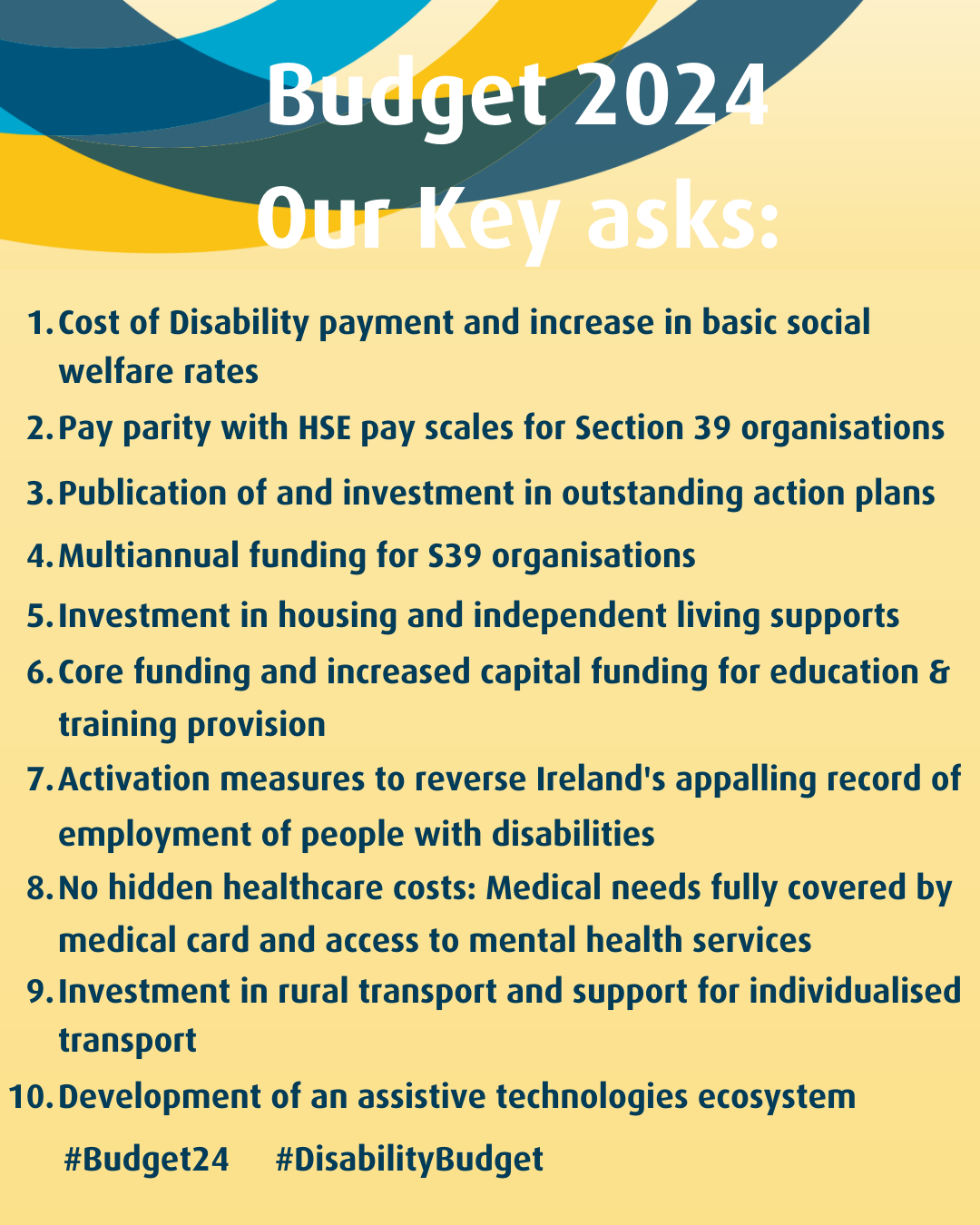Disabled people struggling to “heat their homes and light their stoves” in ongoing cost of living crisis with little support from Government.
Rehab Group launches its Pre-Budget Submission 2024
People with disabilities say they cannot survive independently without financial support from family, depend on food banks to meet food bills, and struggle to cope with exceptionally high energy costs.
These are some testimonials outlined in the Rehab Group’s Pre-Budget Submission launched today as the country’s largest disability group calls on the Government to ensure that Budget 2024 delivers a more equitable society and develops pathways to full community participation for disabled people.
Rehab Group employees have experienced a significant increase in requests to link service users with community supports such as Saint Vincent De Paul to ensure people can “heat their homes and light their stoves”.
Rehab carried out 49 in-depth focus groups in preparing its submission with more than 460 people who use its services nationwide. A common thread running through these groups was the double burden of a cost-of-living crisis for disabled people, lack of suitable housing, hidden healthcare costs, a desire to live self-determined, independent lives, and the need for urgent action to address the cost of disability.
Adult services users who long for independence reported being forced to live at home with their parents. People with disabilities seeking private-rented accommodation in a housing crisis face enormous challenges as most rental properties are unsuitable and cannot be easily adapted. Service users also reported significant issues with managing day-to-day living at home or living independently with the limited number of PA hours they received, with some effectively confined to their homes due to the lack of PA support.
Unexpected health-related expenses are also causing stress to service users as medical cards fail to cover hidden charges like dental charges, blood tests and prescription charges. Moreover, medical procedures or appointments that are covered by the medical card have such unacceptable waiting lists that participants in urgent need of treatment have to seek assistance from family members to pay privately.
Just 36 per cent of people with disabilities in Ireland are employed, which is half the employment rate for people without disabilities. The disability employment gap in Ireland is larger than in most OECD countries and twice the OECD average. This is even though almost two-thirds of those receiving a disability payment in Ireland say they can work.
Rehab welcomes the findings of a recent government-commissioned OECD report that recommends the job prospects of people with disabilities could be improved by making it obligatory to employ disabled people in state contracts. The OECD report called on the state to start measuring the number of people with disabilities employed through specific state contracts known as framework agreements. These agreements are worth around €1.1 billion per year. Rehab Group has been campaigning for several years to make socially responsible public procurement work to enhance employment opportunities for people with disabilities.
Rehab Group CEO Barry McGinn said, “Disabled people are marginalised by financial, physical, and societal constraints that reinforce our unequal society. The results of our focus groups corroborate the findings of the Cost of Disability report, with participants highlighting difficulties in surviving financially with day-to-day expenses, especially those considering living independently. Specific barriers lead people with disabilities into an almost unending cycle of relying on welfare payments that do not meet their needs.”
Although a common thread throughout the groups was how difficult it was to survive on social welfare payments, many outlined that living independently or without their family’s support would be “impossible.”
Mr McGinn added: “At the same time, the disability sector is in crisis. A raft of evidence-based reports sit on Ministers’ desks, awaiting action or implementation plans, including the Indecon Cost of Disability Report, the Disability Capacity Review and the UNCRPD Implementation Plan. The Government knows the scope of the problem and what needs to be done. It is now time for action and investment to resource these plans. Ireland has a way to go to meet the needs and rights of disabled people as outlined in the United Nations Convention on the Rights of Persons with a Disability.”
Mr McGinn also expressed grave concern about the Section 39 pay talks collapse at the Workplace Relations Commission on Monday, 31 July, saying the pay parity issue for staff in Section 39 organisations is now “beyond crisis level.” “Section 39 organisations are haemorrhaging staff who can move to equivalent positions in the HSE or Section 38 organisations where the salary is higher and other terms and conditions are more attractive.”
“Individuals and families relying on services from Section 39 organisations have the right to the same level of service as those in Section 38 and HSE-provided services. The collapse of the talks on Monday have dealt a devastating blow to Section 39 organisations and their staff are now left in limbo. We are calling on the Government to provide funding for full pay restoration for Section 39 organisations and return to alignment with HSE pay scales.”
Many of the issues raised in Rehab’s Pre-Budget Submission in 2023 are still relevant in this submission for Budget 2024. The key asks the organisation put forward last year and, indeed, in previous years, remain unaddressed or inadequately tackled.
“With just two budgets to go to fulfil the commitments in the Programme for Government, this must be the year that those issues are progressed in a meaningful way,” concluded Mr McGinn.
Link to full Pre-Budget Submission
Rehab’s ten key asks for Budget 2024 are as follows:

